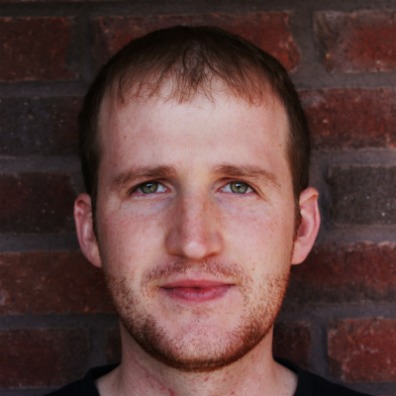
Nathan Gower
Fiction
Nathan Gower holds a M.F.A. in Writing from Spalding University and currently serves as an Assistant Professor of English at Campbellsville University in Louisville, Kentucky. A writer of fiction, poetry, and critical essays, his work has appeared in various literary and academic journals, most recently including The Birmingham Arts Journal, The Atrium, Paradigm, and elsewhere. He lives with his wife and two daughters in Charlestown, Indiana.
Digging the Hole
Where are you? Evie asks. We lie in bed, staring away from each other. This is our habit. This is our life.
The first time Evie and I slept together was an accident. I fell into her in the midst of our collective drunken stupor the way a tottering child might fall into his first busted lip. We rolled, felt, hurt, and screamed our way into the next five years where our world became different than yours, different than anyone's. We blossomed like tiger lilies, our flowers bursting from a single overnight rain, so much love, so much color that we knew we'd have to die too soon.
On one of the happy nights we drove my Explorer to the middle of an empty field. We took a fifth of Jack and swigged from the bottle, never even thought about the ruts the tires dug into private land. The liquor ate our insides the way that it will, and Evie said she wanted to have my baby, a boy if I could swing it. She let her clay-red hair slip over her eyes, just let it play on her face like it didn't even tickle. I would have traded everything I owned to be the one she'd let tuck it behind her ear. It's magical to think we conceived that night. We probably didn't, but we tell each other we did.
Matthew Alexander had gray eyes and perfect waves of black hair, so perfect that Evie says she ordered him from a catalogue. She felt lonely and happy when she tucked him close to her breast, as he cried hoarsely through the night--not even a cry at all, but air escaping from his lungs the best it could, as if it already knew what was coming. Evie was a whirlwind in those days. She looked like the painting that hung on our bedroom wall: an Indian woman twisting out of her skin, her soul flying blue across an orange-red sky.
Doctors changed their minds a lot, but it didn't help in the end. We drank a lot after the fact, one burn on top of another. Now, we stay up all night staring away from each other, wondering who will blow up first. I can't ask her what she thinks about on these lonely nights. I'll never know for sure, but I think we're haunted by the same image: the size of the hole in the ground—three times as big as his shoebox-sized body—like if they kept digging, maybe, just maybe, he would have had more time to grow into it.
Where are you? she asks again. Our silence thumps in my eardrums like a beating heart.
“ Writing the first draft of Digging the Hole was, for me, a method of catharsis. I had heard a young couple recount the story of losing their only child, their voices tinged with equal parts heroic resolve and anguish. After their story bubbled inside of me for several days, I had to get it out on paper. What struck me the most about this couple was the way they were able to love each other so fully, if differently, after the death of their child. I imagined what such a tragic experience would be like for a couple who wasn’t so strong, who didn’t know how to love each other in moments of desperation, and the final draft of Digging the Hole was the result. ”
